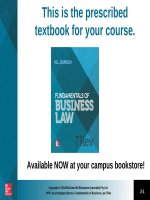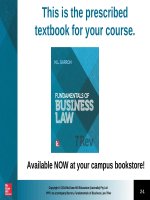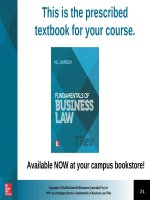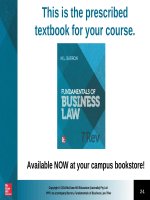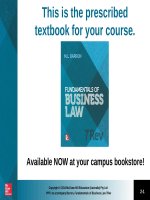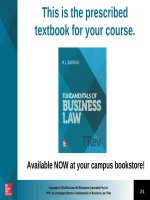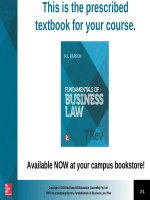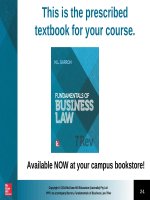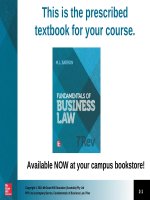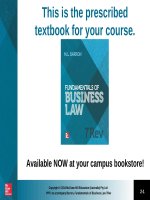- Trang chủ >>
- Thạc sĩ - Cao học >>
- Luật
Lecture Fundamentals of business law (7/e): Chapter 6 - M.L Barron
Bạn đang xem bản rút gọn của tài liệu. Xem và tải ngay bản đầy đủ của tài liệu tại đây (412.93 KB, 19 trang )
This is the prescribed
textbook for your course.
Available NOW at your campus bookstore!
Copyright © 2014 McGraw-Hill Education (Australia) Pty Ltd
PPTs to accompany Barron, Fundamentals of Business Law 7Rev
•2-1
The Financial Transaction
Reports Act 1988 and the
Anti-Money Laundering and
Counter-Terrorism Financing
Act 2006
Chapter 6
Copyright © 2014 McGraw-Hill Education (Australia) Pty Ltd
PPTs to accompany Barron, Fundamentals of Business Law 7Rev
•2-2
Learning objectives
At the end of this chapter you should
understand:
• the objectives of the FTR Act and the AML/CTF Act
• to whom the Acts apply
• the types of transactions that must be reported
• the requirements that must be met for customer
identification
• the penalties imposed by the Acts
• the impact of the Acts on businesses and trade
• the role of AUSTRAC in relation to the Acts.
Copyright © 2014 McGraw-Hill Education (Australia) Pty Ltd
PPTs to accompany Barron, Fundamentals of Business Law 7Rev
•2-3
Introduction
• Object of the Financial Transactions
Report Act 1988 (Cwlth):
To assist in the detection of tax evasion
and other criminal activity, such as
corporate crime and the ‘laundering’ of
money obtained from drug trafficking
and organised crime.
Copyright © 2014 McGraw-Hill Education (Australia) Pty Ltd
PPTs to accompany Barron, Fundamentals of Business Law 7Rev
•2-4
The Australian Transaction Reports
and Analysis Centre (AUSTRAC)
•
•
Body responsible for administering the Act:
– Collects
– Compiles
– Analyses
– Distributes information
Makes information available to:
– Australian Tax Office
– Australian Federal Police
– Australian Customs Service
– National Crimes Commission
– Australian Securities and Investments Commission
Copyright © 2014 McGraw-Hill Education (Australia) Pty Ltd
PPTs to accompany Barron, Fundamentals of Business Law 7Rev
•2-5
Obligations and reporting
requirements
•
•
•
Cash dealers—s3(1):
– Banks and building societies
– Insurance and finance companies
– Securities and futures dealers
– Casinos, bookmakers and totalisator agency board (TAB)
– Solicitors
To report:
– Cash transactions (i.e. the physical transfer of currency
from one person to another of not less than $10 000
within Australia)
– Suspect transactions
Within:
– 1 or 2 days of suspect transaction
– 15 days of transaction involving Australian currency
(1 or 2 days if suspect)
– day after transactions involving foreign currency.
Copyright © 2014 McGraw-Hill Education (Australia) Pty Ltd
PPTs to accompany Barron, Fundamentals of Business Law 7Rev
•2-6
Exemptions from the requirement
to report
• Must involve a financial institution
• The transaction can be:
– entered in an exemptions register
– be in an exceptional category that is
automatically exempt, e.g. withdrawals for
payroll purposes.
Copyright © 2014 McGraw-Hill Education (Australia) Pty Ltd
PPTs to accompany Barron, Fundamentals of Business Law 7Rev
•2-7
Reporting the importing and
exporting of currency
Where members of the community
personally convey into or out of Australia,
Australian currency or foreign currency not
less than A$10 000, it must be reported to a
customs officer at the time.
Copyright © 2014 McGraw-Hill Education (Australia) Pty Ltd
PPTs to accompany Barron, Fundamentals of Business Law 7Rev
•2-8
Reporting on ‘suspect transactions’
• Suspect transactions are those that cause the
cash dealer to feel apprehensive or mistrustful
about the transaction (non-cash and cash
transactions), and may be relevant with respect to:
– tax evasion or attempted evasion
– an offence against the law of the
Commonwealth or a territory
– the Proceeds of Crimes Act 1987 (Cwlth).
They must be reported as soon as
practicable.
Copyright © 2014 McGraw-Hill Education (Australia) Pty Ltd
PPTs to accompany Barron, Fundamentals of Business Law 7Rev
•2-9
Opening new accounts
Signatory to account must be identified via:
• identification reference
• primary or secondary identification document.
Copyright © 2014 McGraw-Hill Education (Australia) Pty Ltd
PPTs to accompany Barron, Fundamentals of Business Law 7Rev
•2-10
International funds transfer
instructions
• Money transferred into or out of Australia:
– Electronically
– Telegraphically
• Requires reporting
Copyright © 2014 McGraw-Hill Education (Australia) Pty Ltd
PPTs to accompany Barron, Fundamentals of Business Law 7Rev
•2-11
Identifying cash dealer
Approved by director of AUSTRAC as
a cash dealer who can verify the
identity of signatories to accounts,
utilising the 100 points system.
Copyright © 2014 McGraw-Hill Education (Australia) Pty Ltd
PPTs to accompany Barron, Fundamentals of Business Law 7Rev
•2-12
Penalties for failure to comply
Natural person Body corporate
Failure to provide
information
Fine up to $5000
Imprisonment up to
2 yrs
Fine up to $25 000
Breach of
currency transfer
requirements
Fine up to $10 000
Imprisonment up to
5 yrs
Fine up to $50 000
Opening bank
account in false
name
Fine up to $5000
Imprisonment up to
2 yrs
Fine up to $25 000
Contravention
of Act
Injunction
Injunction
Copyright © 2014 McGraw-Hill Education (Australia) Pty Ltd
PPTs to accompany Barron, Fundamentals of Business Law 7Rev
•2-13
Impact of the act on business and
consumer trade
• Businesses wishing to open an account
may
find the requirements imposed by the Act
time-consuming and difficult.
• Businesses may need to employ
additional staff and give staff training to
ensure compliance with the obligations
imposed by the Act, which will increase
the costs of operating a business.
Copyright © 2014 McGraw-Hill Education (Australia) Pty Ltd
PPTs to accompany Barron, Fundamentals of Business Law 7Rev
•2-14
The Anti-Money Laundering and
Counter-Terrorism Financing Act
2006 (Cwlth) (AML/CTF Act)
Objective of the AML/CTF Act:
To bring Australia in line with
international best practice in detecting
and deterring money laundering and
the financing of terrorism.
It supplements the Financial
Transactions Reports Act.
Copyright © 2014 McGraw-Hill Education (Australia) Pty Ltd
PPTs to accompany Barron, Fundamentals of Business Law 7Rev
•2-15
To whom does the AML/CTF
Act apply?
• Broadens the range of the FTR Act
• Includes the financial sector, the gambling
sector, bullion dealers and other professionals
or businesses providing ‘designated services’
• ‘Designated services’ include:
– opening an account
– accepting money on deposit
– making a loan
– sending and receiving instructions on
electronic funds transfers.
Copyright © 2014 McGraw-Hill Education (Australia) Pty Ltd
PPTs to accompany Barron, Fundamentals of Business Law 7Rev
•2-16
Obligations imposed by AML/CTF Act
on providers of designated services
• Extends reporting obligations for both significant
cash transactions and suspicious transactions
• Broadens reporting requirements beyond just cash
to include e-currency and bearer negotiable
instruments
• Obliges providers to use risk assessment
approach to monitoring transactions
• Introduces legally binding documented compliance
programs:
– Part A (General)
– Part B (Customer Identification)
Copyright © 2014 McGraw-Hill Education (Australia) Pty Ltd
PPTs to accompany Barron, Fundamentals of Business Law 7Rev
•2-17
Civil penalties for breach of
AML/CTF Act
• Body Corporate—maximum $11 million
• All other cases—maximum $2.2 million
Copyright © 2014 McGraw-Hill Education (Australia) Pty Ltd
PPTs to accompany Barron, Fundamentals of Business Law 7Rev
•2-18
AUSTRAC’s role under the
AML/CTF Act
• AUSTRAC:
– has expanded its role to include the
administration of the AML/CTF Act
– has supervisory, monitoring and
enforcement functions
– seeks to educate relevant industries to
facilitate compliance and co-operation
with the Act.
Copyright © 2014 McGraw-Hill Education (Australia) Pty Ltd
PPTs to accompany Barron, Fundamentals of Business Law 7Rev
•2-19
